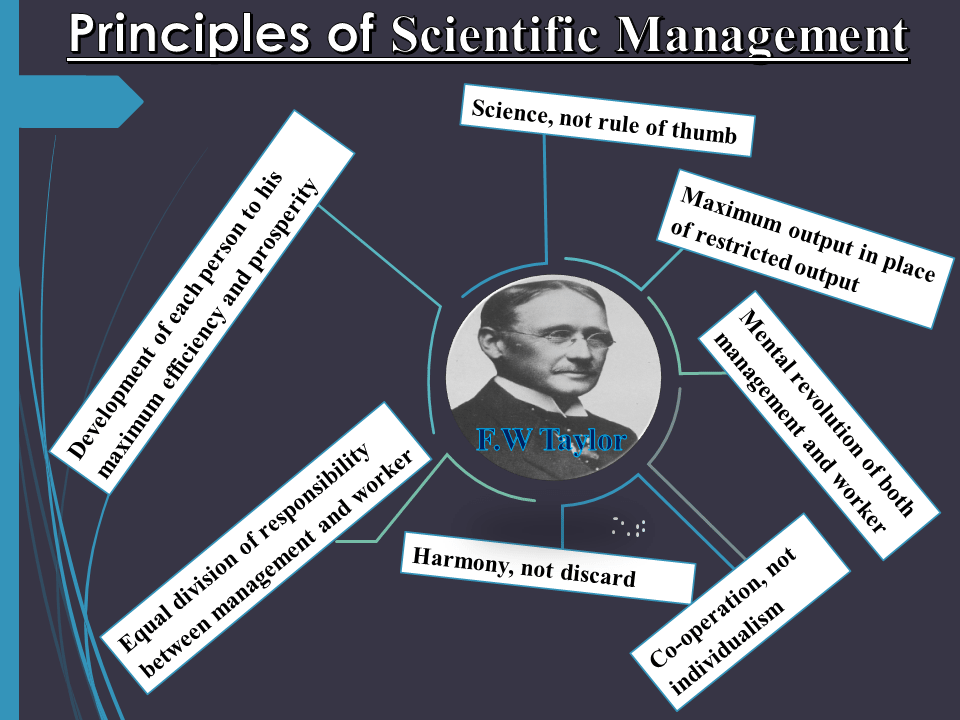Table of Contents
Meaning of Scientific Management Theory:
Scientific management theory is an attitude and philosophy, which discard the traditional method of hit and miss, rule of thumb, trial and error of managing work and worker and developed the systematic and scientific method of managing work and worker.
This theory was developed to solve two major problems;
- How to increase the output of the average worker
- How to improve the efficiency of management.
This theory was developed by Frederick Winslow Taylor (F.W Taylor). He is also known as the ‘Father of Scientific Management’. And one of the prominent scholars to introduce scientific management. He was convinced that there is a science for doing each job.
According to F.W Taylor
“Scientific management means knowing exactly what you men want to do and seeing that they do in the best and cheapest way.”
Principles of Scientific Management Theory:

a) Science, not rule of thumb
Scientific management requires the scientific study and analysis of each type of work in order to replace the rule of thumb (i.e, hit and trial method). F.W Taylor develops the best way of doing work through scientific investigation. It consists of observation and analysis of each work, determination of standard of work, and ensure that work is to be done in the best possible way.
b) Harmony, not discard
A group should work as a unit and contribute the maximum effort. Every organization must have good relations and understanding between the members of groups and departments. The concept of coordination must be developed in the organization for goal achievement.
c) Co-operation, not individualism
Co-operation between management and labor is the foundation of scientific management. Close co-operation and relations should maintain among the employees and employers as well as among the employees themselves. The feeling of belongingness must be developed among all the workers.
d) Development of each person to his maximum efficiency and prosperity
There should be scientific selection, proper training, and the development of employees. Efforts should be made to increase the efficiency and prosperity of employees. Management has to take the necessary steps to develop the working efficiency and capability of each worker.
e) Maximum output in place of restricted output
Management should introduce new technology, ideas for the huge production of goods. Management gives the wages to the worker at a piece-rate system which increases the working efficiency of the organizational performance. And more output is made. It also ensures the maximum profit to the owner because more volume of production minimizes cost per unit output.
f) Equal division of responsibility between management and worker
This principle of scientific management has specified the responsibilities of manager and worker. According to these principles, managers must concentrate on the planning of work and workers for the implementation of plans in practice.
g) Mental revolution of both management and workers.
No plan of management will effectively implement. if there isn’t a feeling on both management and worker of doing the work hard. This is possible through mutual revolution and the development of an attitude of hospitality and co-ordination to works with each other.
Contribution of Scientific Management Theory
- It emphasized improving the working condition by reducing fatigue and redesigning machines and tools
- This brings a change in the attitude of employer and employee.
- It increases the working efficiency of the worker by giving wages at the piece-rate system.
- It emphasizes on training and development of workers, which help to increase output and reduce wastages of materials and time.
Limitation of Scientific Management Theory
- Focus on Mechanistic Approach
This theory assumes that a human is a machine that works for remuneration. Management can take any strategy to get maximum effort from them. It totally focuses on the mechanistic approach and ignores the human relation approaches.
- Ignore Human relation Approach
This theory ignores the human relation approach. Management gives them remuneration on the basis of their capability. There is no space for human relations between management and workers.
- Employee feel Monotony
The employee is forced to work the same kind of job in their whole life which lead them to the monotony. They should not get a chance to involve in creative and innovative work.
- More work load
This theory focuses on how to increase the working efficiency of the employees. The manager forced them to work fast which physically and mentally disturbs the employees.
- Lack of Initiation
In this theory, employees are not allow to give any suggestions, views, and ideas to the management. They should work according to the management. The worker is not allows to show their creativity.
- No focus on Group work
This theory focuses only on the individual performance of the employee. Group and teamwork are one of the best strategies of today’s management.






